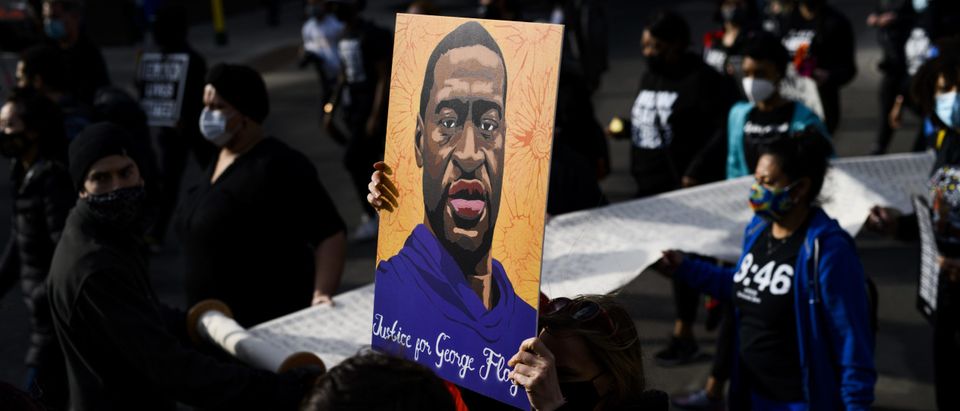Jury selection has begun in the trial of former Minneapolis police officer Derek Chauvin. It’s a case that has gripped the nation and sparked protests around the country.
Chauvin is accused of killing George Floyd in May 2020 and is facing charges of second-degree murder, second-degree manslaughter and potentially third-degree murder. He’s pleaded not guilty to the charges.
He was filmed holding his knee on Floyd’s neck for over nine minutes on May 25 as he attempted to arrest him after a teenager working at Cup Foods in Minneapolis called the police over an alleged counterfeit bill.
Jury selection was set to begin Monday but almost immediately stalled as Hennepin County District Judge Peter Cahill awaited an appeals court decision regarding possibly re-adding a third-degree murder charge. Despite it moving forward Tuesday, there are many moving parts to consider regarding this case.
Outside the courthouse ahead jury selection beginning, protesters flocked to Minnesota over the weekend, NPR reported. Floyd’s death caused substantial damage to the city of Minneapolis in 2020, and both peaceful and violent protests and riots ensued country-wide for the remainder of the year. (RELATED: ‘Do Not Result To Looting Or Violence’: George Floyd’s Uncle Asks For Peace Ahead Of Derek Chauvin Trial)
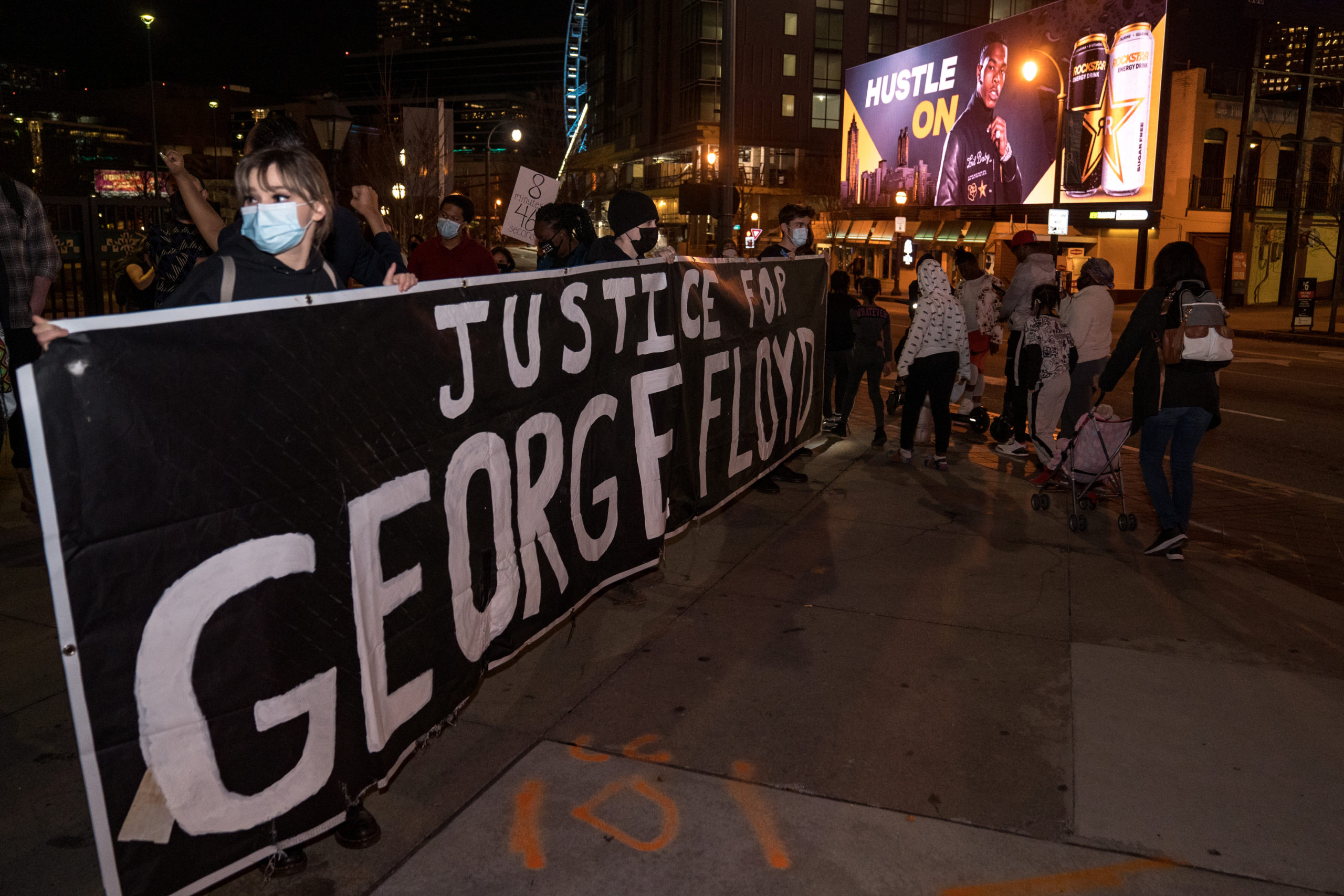
Demonstrators hold a vigil in honor of George Floyd on March 8, 2021 in Atlanta, Georgia. (Megan Varner/Getty Images)
Jury Selection
While the nation awaits for a decision in Chauvin’s trial, it’s important to note that the process is unlikely to be a quick one. Jury selection alone could take weeks and 16 possible jurors have already been dismissed, the Associated Press previously reported.
Each potential juror will be questioned by Cahill, Minnesota Attorney General Keith Ellison and Chauvin’s defense lawyer Eric Nelson. The first roadblock will be finding 12 jurors and two alternates suitable for the job in a case that’s been widely reported throughout the world.
Potential jurors will be asked various questions to gauge how familiar they are with the case, including how often they watched the body camera footage showing Floyd’s arrest and whether they took part in any protests, according to the AP. Potential jurors have also already been sent a questionnaire in an effort to find impartial individuals.
Opening Statements
The earliest date opening statements will begin is March 29, according to the AP, though this cannot begin before all of the jurors have been selected.
Opening statements are the first chance for lawyers to address the jury and traditionally the prosecution is the first to speak, according to Cornell Law School. The defendant’s lawyer speaks immediately afterwards, and each opening statement will frame “the evidence in a way that is favorable to the counsel’s theory of the case,” Cornell Law School noted.
Opening statements are also a chance for each party to explain what they expect to prove, and they can last anywhere from a few minutes to a few hours. (RELATED: ‘You’re Going To Kill Me Man’: Body Cam Transcripts Show George Floyd Told Officers He Couldn’t Breathe 20 Times)
What do the charges mean?
Chauvin, 44, worked for the Minneapolis Police Department for over 19 years before being fired after Floyd’s death. Three other officers present at the scene during the incident are also facing charges.
Chauvin’s most serious charge of second-degree murder could bring him up to 40 years in jail if convicted. Second-degree murder is when an individual “causes the death of a human being with intent to effect the death of that person or another, but without premeditation,” according to Minnesota’s state statutes.
Chauvin was originally charged with third-degree murder, but it was upgraded in June 2020, Kiro7 reported.
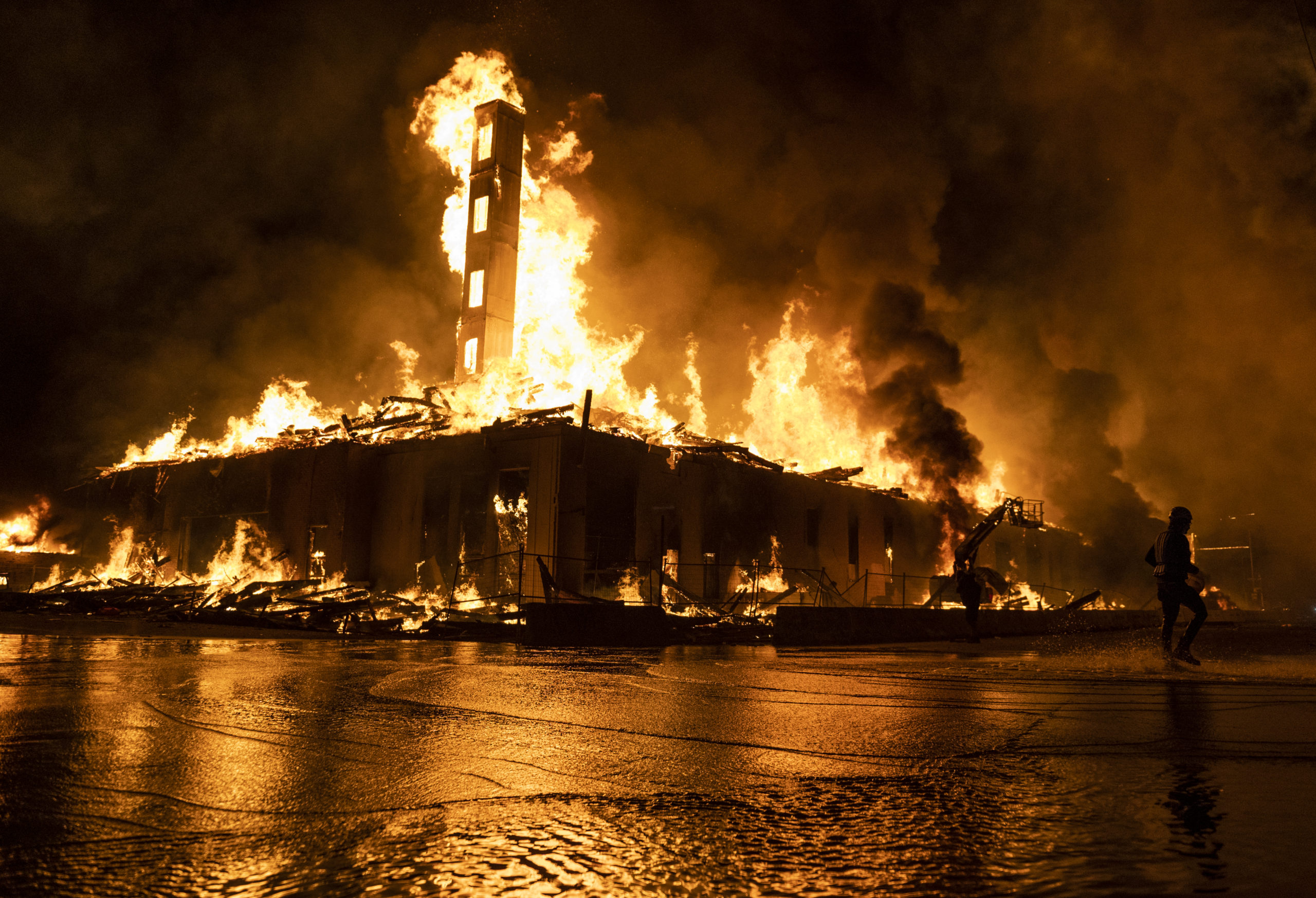
A construction site burns in a large fire near the Third Police Precinct on May 27, 2020 in Minneapolis, Minnesota. (Stephen Maturen/Getty Images)
The former Minneapolis police officer is also facing a second-degree manslaughter charge. If convicted, this charge carries a sentence of up to 10 years in jail. Prosecutors will have to prove that Chauvin is guilty of one of five means listed on Minnesota’s state statutes in order for this charge to stick.
In addition to the second-degree murder and second-degree manslaughter charges, Chauvin may face an additional third-degree murder charge – the charge that delayed jury selection Monday.
A third-degree murder charge has a maximum sentence of 25 years in prison and requires the prosecution to show that Floyd died at the hands of an “obviously dangerous” act, the AP reported.
“Chauvin has no criminal history, which means he will probably end up serving about 12 1/2 years whether he is convicted of second or third-degree murder,” the AP speculated.
What will Chauvin’s defense be?
While the specifics of Chauvin’s defense have not yet been revealed, portions of it have been made known to the public through various court filings, the NYT reported.
One possible defense is to shift the blame on other officers who are also facing charges regarding Floyd’s death, a move that Chauvin’s defense made at the very start of the case.
“If [former officer J. Alexander] Kueng and [former officer Thomas] Lane had chosen to de-escalate instead of struggle, Mr. Floyd might have survived,” Nelson previously wrote according to the NYT. “If Kueng and Lane had recognized the apparent signs of an opioid overdose and rendered aid, such as administering naloxone, Mr. Floyd might have survived.”
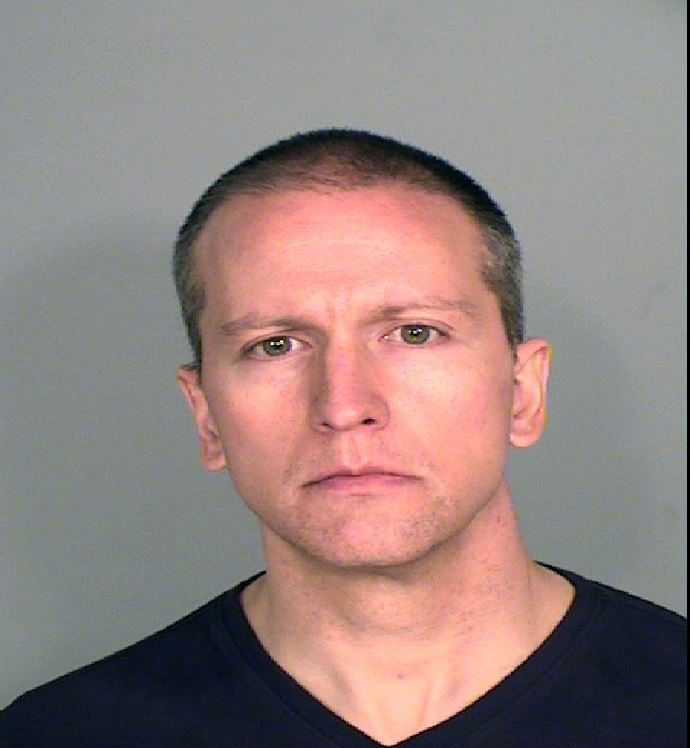
In this handout provided by Ramsey County Sheriff’s Office, former Minneapolis police officer Derek Chauvin poses for a mugshot after being charged in the death of George Floyd. (Ramsey County Sheriff’s Office via Getty Images)
The biggest defense, however, is likely to focus on Floyd’s drug use and overall health coupled with the argument that Chauvin’s use of force was within the confines of the law.
Hennepin County medical examiner Dr. Andrew Baker ruled Floyd’s death a homicide and noted that Chauvin’s use of force, drugs in Floyd’s system and underlying health conditions all contributed, according to the NYT. Baker also admitted that Floyd had enough fentanyl in his system where, had he been found home alone, he would have been allowed to rule it as an overdose death.
Baker noted that he’s not able to confirm whether Floyd would have died due for other reasons if Chauvin had not kneeled on his neck for several minutes, the NYT reported.
What will the prosecution argue?
The burden of proof for all cases lies on the prosecution. This means, for example, that prosecutors will need to prove that Chauvin “was committing or attempting to commit” a felony during Floyd’s death in order for the second-degree murder charge to stick, according to the NYT. (RELATED: New Video Shows Moments Leading Up To George Floyd Being Pinned On Ground)
To prove this, prosecutors will likely argue that Chauvin’s actions – putting his knee on Floyd’s neck for several minutes as Floyd cried out that he’s couldn’t breathe – was third-degree assault, as Chauvin is facing charges under the felony murder doctrine, the NYT added.
The prosecution must only prove that Chauvin’s actions “contributed to” Floyd’s death, according to Cahill. This means that they won’t need to prove that Chauvin’s use of force was the sole reason for Floyd’s death.
In the end, the prosecution will need to prove guilt beyond a reasonable double. This may not be as easy as some think, experts have noted. Even with the video evidence showing Chauvin kneeling on Floyd’s neck, the case is likely to be “anything but a slam dunk,” according to CBS News.
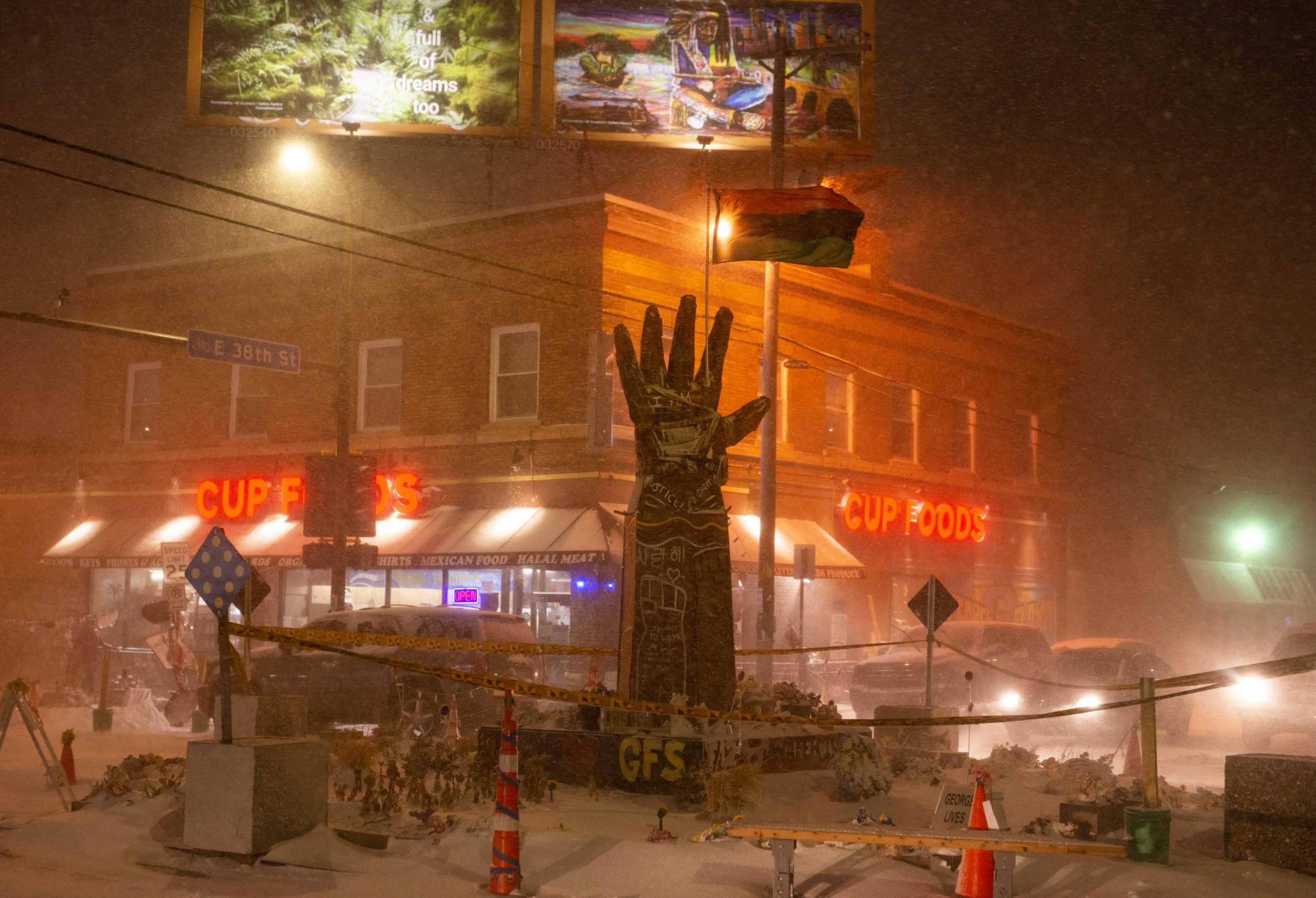
Heavy snow flies during a snowstorm at George Floyd Square, the memorial site for George Floyd, on December 23, 2020 in Minneapolis, Minnesota. (Stephen Maturen/Getty Images)
How long will the trial last?
Those curious about the trial should not expect a quick verdict. Once opening statements begin – no earlier than March 29 – trial proceedings are likely to continue for two to four weeks, according to CBS News. Both the prosecution and defense teams are also likely to call many witnesses to the stand as each argue their side of the case.
After the trial concludes, the jury will meet to deliberate, and it’s unknown how long this process will go for. Some juries have come back with a decision within hours while others have deliberated for weeks. The trial process may be wrapped up by late April, CBS News speculated.
If Chauvin is convicted, he will be given a sentencing hearing date and will be allowed to appeal the decision.


